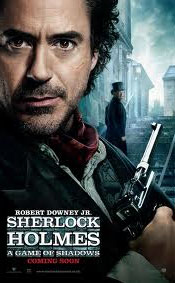
Top stories






More news

ESG & Sustainability
Redisa calls on govt to fix South Africa’s “broken” waste management system























By this logic, I should have been particularly disappointed by Sherlock Holmes - and yet I wasn't. The movie is a (very) loose adaptation of the tales by Sir Arthur Conan Doyle. It downplays some parts (like the drug use) and overplays others (like his constant quirks and killer abs). None of that mattered because it still felt like a fresh take and was something that modern audiences would find rather fun. Sadly, I'm mostly talking about the first movie. In this instalment, things go a bit too far.
The movie picks up where the first left off. Holmes (Robert Downey Jr) and his faithful friend Watson (Jude Law) are now living separately. It seems like their partnership is over now that Watson simply wants to get married, enjoy his honeymoon, and move on with his life. But there's one more case to solve. This time it involves Professor James Moriarty (Jared Harris from Mad Men), an incendiary mathematician with the ambitions of a James Bond thug. Has Holmes finally met his mental match?
Perhaps the franchise is suffering from a case of early onset fatigue. Director Guy Ritchie does what he can to add some energy, but it feels like he's relying too much on what worked the first time around. Maybe that's fine for getting composer Hans Zimmer to write another score (his music for the first movie was nominated for an Oscar). Otherwise, it's just not enough. For example, some of Holmes's deductions don't feel particularly smart. They either come so late that you've already figured them out or they come so quickly that they feel like simple statements of fact. I'm pretty sure that Moriarty's ultimate plan is something we've seen in a movie before, but I can't remember which (and probably shouldn't say, lest I give away too much).
It's the same with the slow-motion special effects. Yes, they're really great to look at, but they too grow stale, especially in that chase through the woods. (How so many explosions make any sense in a movie that's set in the late 19th century is beyond me.) It's also the same with the bromance between Watson and Holmes. The first movie was already pushing their tête-à-têtes a little close to the edge; now the banter feels painfully old. It's like the movie can't decide if it wants to play out as a comedy or as the action/adventure it's supposed to be. I mean did we really have to see Stephen Fry (playing Sherlock's brother) naked?!
Still, Sherlock Homes: A Game of Shadows is a good night out. It'll mostly appeal to younger movie-goers who prefer brawn over brains (and will be so busy texting in the cinema that they won't notice the missing depth). Unfortunately, those expecting more won't get that. That's because not enough action takes place in Sherlock's mind, as was the case in the original tales. Yes, there's a wonderful scene at the end in which Holmes and Moriarty engage in a game of mental chess, but that's about it. Perhaps Sherlock Holmes was right to say that "life is infinitely stranger than anything which the mind of man could invent". Or perhaps man should try a little harder.
Rating: 3 out of 5
Running Time: 2 hours, 9 minutes
Age Restriction: PG-13 (contains excessive explosions and the destruction of innocent trees)
